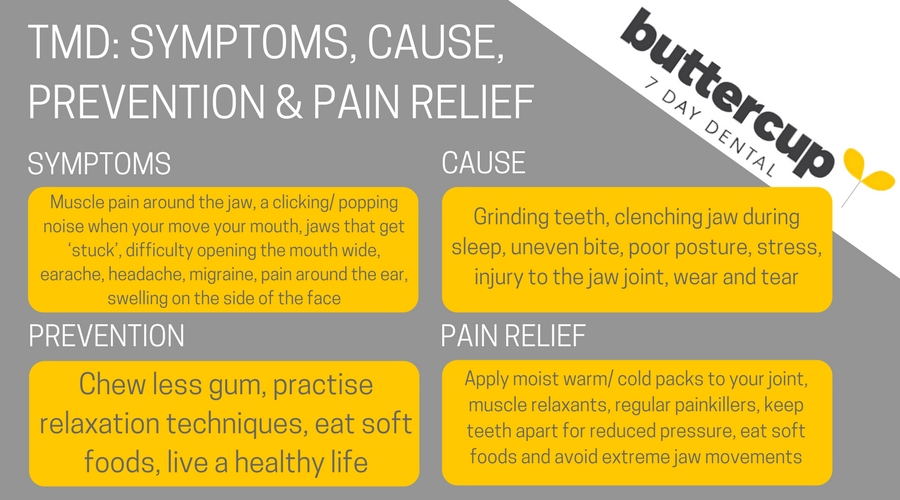Other Articles,
Can Stress Relief Help Prevent TMD?
By Buttercup 7 Day Dental 22nd Mar 2017
What is Temporomandibular Joint Disorder (TMD)?
According to the NHS, 30% of all adults will experience temporomandibular disorder (TMD) at some point in their life.
TMD is a problem affecting your joints between your lower jaw and your skull, making it uncomfortable or painful to use your jaw. The temporomandibular joint is the joint which lets you move your jaw up and down, from side to side, allows you to talk, chew and yawn.
 Symptoms
Symptoms
For an unknown reason, more women than men suffer from TMD. TMD can often cause severe pain and discomfort. It can either be temporarily or last for years.
Some of the most common symptoms of TMD include:
- Muscle pain around the jaw
- A clicking/ popping noise when your move your mouth
- Jaws that get ‘stuck’
- Difficulty opening the mouth wide
- Earache
- Headache
- Migraine
- Pain around the ear
- Swelling on the side of your face
Cause
Exactly what causes TMD is unknown, but there is a handful of possible causes.
- Grinding/ clenching your jaw during sleep – if you’re a grinder, it’s bad news for you temporomandibular joint. Sleep is for relaxing, and if your jaw is clenched or tensed it puts unwanted pressure on the joint.
- Uneven bite – if you’ve had a filling at the dentist that’s fitted bit higher than usual, your bite can change. An uneven bite can cause to TMD.
- Poor posture – a poor posture can disturb the natural alignment of your your muscles and facial bones, often causing discomfort and pain
- Stress – some people will experience enhanced sensitivity when they’re stressed. Stress often leads to tightened facial and jaw muscles and clenched teeth – putting the temporomandibular joint to overwork.
- Injury to the jaw joint – if you’ve suffered a blow to the face, or have had surgery.
- Wear and tear – as you age, so do your joints. From being used every day, your temporomandibular joint can suffer from wear and tear. Wear and tear can cause osteoarthritis, and that can lead to TMD.
Prevention
There are a number of ways that you can help prevent temporomandibular joint disorder. Your main concern should be to reduce muscle tension in your jaw
- Lay off the chewing gum – if you’re a super chewer, you might have to lay off the gum for a while, or step down. When you chew, there’s a constant tension in your jaw muscles. If your temporomandibular joint is stressed, it can cause TMD.
- Practise stress relief/ relaxation techniques – if you’re living your life voll gas and have a lot of stress and anxiety in your everyday life, consider learning some relaxation techniques. Our bodies hold stress in different ways, but many of us hold stress in our jaw joint. If you can learn to relax your muscles, your temporomandibular joint will thank your for it.
- Eat soft foods – you obviously can’t eat yogurts and mashed bananas all the time, but try to go for softer food options when you can, especially if you can feel a sore jaw coming on. Take it easy with chewy and hard foods such as caramels, raw carrots etc.
- Live a healthy life – both being overweight and having a poor posture can increase your chances of TMD. If you make sure to live a healthy lifestyle, lose the extra pounds and stretch your back it will not only have a positive impact on your well being, but on your temporomandibular joint.
Pain relief
If you think you’ve got TMD you should book an appointment with your dentist or see your local GP to discuss treatment options.
In the meantime, there are a number of ways to help with pain relief
- Apply moist heat/ cold packs to your jaw
- Take muscle relaxants/ painkillers
- Keep your teeth apart to reduce pressure on your temporomandibular joint
- Eat soft foods, and avoid extreme jaw movements
Similar Posts
The Importance of Local Dental Services: A Perspective from Buttercup 7 Day Dental
By Hannah Kemp • 06th Oct 2023
Access Quality Dental Services in Glasgow with Buttercup 7 Day Dental
By Hannah Kemp • 01st Mar 2024
Dental Emergency: What To Do, Who To Call, Where To Go
By Buttercup 7 Day Dental • 15th Aug 2017


